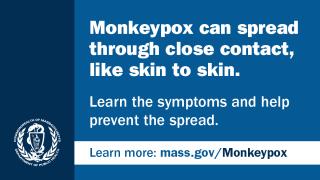Monkeypox remains an ongoing threat. There are 134 total cases in Massachusetts since the state’s first case was announced May 18th

The MA DPH is working with local health officials, patients, and healthcare providers to identify individuals who may have been in contact with the patients while they were infectious.
Top things to know about this virus:
• While the virus does not spread easily between people, individuals can spread the infection once they develop symptoms. Transmission occurs through direct contact with body fluids and monkeypox sores, by touching items that have been contaminated with fluids or sores (clothing, bedding, towels, etc.), or less commonly, through respiratory droplets following prolonged face-to-face contact. This virus does NOT spread through Casual conversations, walking by someone with monkeypox in a grocery store, or touching items like doorknobs.
• Early symptoms of monkeypox can include fever, headache, sore throat, and swollen lymph nodes, but rash may be the first symptom. Rash lesions start flat, become raised, fill with clear fluid (vesicles), and then become pustules (filled with pus). A person with monkeypox can have many lesions or only a few. Learn more about how to recognize monkeypox.
• Actions for people to consider if they want to reduce their risk from monkeypox include: Avoiding large gatherings like raves and dance parties where you may have lots of close body contact with others, and asking any partner, especially new partners whose health status and recent travel history you are not familiar with, if they have any symptoms of monkeypox
• As the CDC advises, if you believe you may have monkeypox, you should contact your health care provider. If you need to leave your home, wear a mask, and cover your rash or lesions when around others.
See more information on monkeypox vaccination & eligibility in MA here, and more on Monkeypox from MassGov & the CDC

